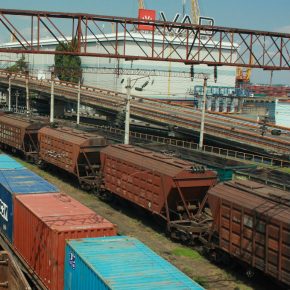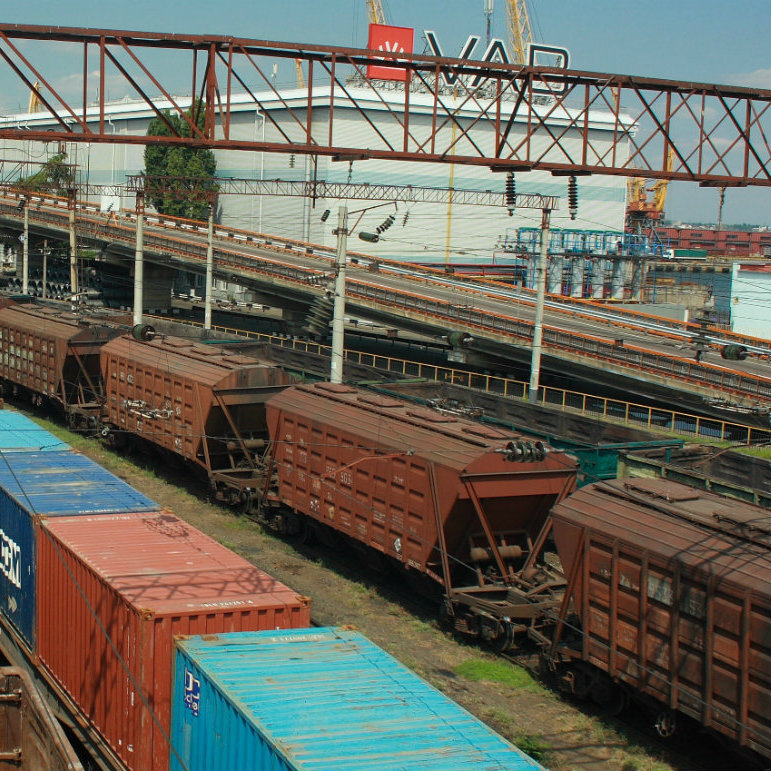Tydzień w gospodarce
Category: Trendy gospodarcze

Cargo terminal, Odessa - part of the New Silk Road, Ukraine (Dmytrok, CC BY-ND)
The world media are full of allegations that the New Silk Road (NSR) is a propaganda project conducted for the needs of Chinese politics, and that the great Chinese economic plan will only serve China, because it will lead to an even greater opening of markets to Chinese exports. Lately there has also been an outpouring of highly critical analyses of the Chinese initiative.
As confirmed by its subsequent moves, Beijing is still unwavering in its belief that this – as the Chinese call it – “infrastructure project of the century”, covering nearly 2/3 of Earth’s land area, will change the global political and economic system. But that is precisely what the West fears.
The tone of many critical opinions is well represented by the opinion published in the Financial Times that the New Silk Road is “less of a practical plan for investment than a broad political vision”. On this occasion China is accused of economic neo-colonialism, as the generous loans for the infrastructure investments planned as part of the Silk Road will one day have to be paid back – if not in cash, then, for example, in natural resources, which will make weak states even more dependent on China.
The critics of the New Silk Road indicate that it is supposed to run through some 50 countries where the political situation is unstable and countries are torn by internal conflicts, which may call the whole project into question. Interestingly enough, warnings in the same vein have also appeared in the expert debate on the New Silk Road in China, where so far the project has been described exclusively in an overly optimistic tone. It should be added that it is not only the West, but also countries such as Russia, India (which opposes Beijing’s initiative) and Turkey, that look anxiously at China’s expansion, and try to promote their own interests, which in many cases collide with those of the Chinese. One common complaint is that the New Silk Road initiative is too general and undefined.
China has to therefore use a different set of arguments to dispel the Western world’s fears regarding its intentions than in the case of Russia, India and other skeptical countries, without which the project is doomed to failure.
Joseph S. Nye, a political scientist from the Harvard University, who is moderately skeptical about the idea of the New Silk Road, warned against sinking money into misguided and expensive projects (especially in terms of their maintenance rather than implementation itself) in his article “Xi Jinping’s Marco Polo Strategy” .
China, however, is convinced that the huge costs of construction of the New Silk Road will nevertheless be lower than the potential benefits. The Chinese consistently argue that their plan for connection with Europe, with branches reaching Africa or the Middle East, is an exceptional economic opportunity for all nations, and not only for China.
During the last Silk Road Forum in Beijing, the leader of the People’s Republic of China Xi Jinping argued that no country “is able to cope with the growing challenges on its own” and therefore “individual states should coordinate strategies among themselves and seek development opportunities at the global level”. He insisted that this was the only purpose of the Belt and Road initiative, and that there was no place for “political games known from the past”.
When it comes to convincing Europe to its project, Beijing finds it much easier with the so-called new member states of the European Union, including Poland. Although they are engaged in trade with China on a massive scale (the value of China’s trade with the EU is about USD560bn), the countries of Western Europe are afraid of being economically dominated by China and look at the New Silk Road from this angle. Although they do not communicate this outright, they are likely to sabotage China’s initiative rather than support it.
Beijing is attempting to convince the countries from the region of Central and Eastern Europe (read more) using the argument that thanks to Chinese infrastructure financing, they will have a chance to not only become the gateway to Western Europe, but also to increase the value of their trade turnover with China. The countries of CSE region only account for approx. 10 per cent (over USD60bn) of China’s turnover with the EU as a whole. Despite the fact that railway connections between Europe (also including Poland) and China were launched several years ago, the trains going to Asia are only partly filled with goods.
Beijing argues that the poorer states will reap relatively the greatest benefits – investments financed through Chinese loans. They will be able to make money on the transit of goods through their own territories, they will profit from tourist traffic, etc.
In many countries of Central Asia, through which the Silk Road is supposed to run, there is little enthusiasm for investment due to the economic and political risks involved. However, Beijing is declaring that it is prepared to bear these risks.
The New Silk Road is a project planned to be implemented over at least several decades. Western experts are therefore asking what will happen when China’s current leader, who is personally involved in the project, steps down from his post (which is likely to happen in 2023). The Chinese Vice Minister of Commerce Qian Keming reassured in a statement for Reuters that the New Silk Road is not an “individual proposal, or merely left at a proposal level”, and that the durability of the initiative depends on the involvement of the individual countries, and not just China.
Beijing counters the allegations that it still does not have a clear concept of the New Silk Road, saying that the New Silk Road Fund with a capital of USD40bn has been established and that some investments have already been implemented, e.g. the aforementioned rail cargo connection with the EU countries. The Asian Infrastructure Investment Bank (AIIB), created under the auspices of China, is also joining the initiative, and private funds that are supposed to attract investments to the New Silk Road have also been launched. The Xinhua Agency informed that in the years 2014-2016 companies from China concluded contracts worth almost USD305bn for projects “carried out along the land and maritime corridors” of the New Silk Road. Beijing points out that these actions clearly contradict the thesis that their ideas have not been reflected in actions.
It should be noted, however, that the investment amounts presented by China often include agreements and contracts launched before 2013, when the idea of the construction of the New Silk Road was announced.
Beijing is trying to show that it has a vision. China argues that the project will not just be about business, i.e. investment in infrastructure, trade facilitation or the promotion of settlements in local currencies, but will also involve interpersonal, cultural, scientific, and tourist exchange. On this occasion, many catchy historical and cultural references are made to the ancient Silk Road, which supported not only trade contacts between China and Europe. This narrative referring to emotions is supposed to convince and reassure the West that China is not interested in expansion, but in partnership on a number of levels, in accordance with the official Chinese concept of international relations, where all the parties are supposed to win.
It is just that China is supposed to gain a little bit more than the others. The Chinese experts are not hiding that the New Silk Road would facilitate the conversion of their country’s substantial currency assets from US bonds (USD3.3 trillion) into infrastructure investments with a higher rate of return, and would in this way create new markets for Chinese products. This is also a chance for Chinese companies from the steel industry or the construction industry, for which the domestic market has become too small.

